Facilities and Instruments Description framework
Abstract accepted by the LISA Scientific Organization Committee: Title: Shared nomenclature and identifiers for telescopes and instruments First author: Perret, E. Contributors: Louys M., Buga M., Lesteven S. ...Institute: Centre de donnÚes astronomiques de Strasbourg , CNRS- Unistra UMR 7550 Absctract:
In the context of sharing public data, science results are expected to be reproducible and therefore we need full traceability of the origin of the data. On the documentalist side, there is a need to relate instrumental origins to published data. We propose to define a shared nomenclature to index each publication with unique designations for facilities, telescopes and instruments based on the Virtual Observatory work on semantics.
This would help the documentalists to check the consistency of the instrumental description in publications or make it more explicit. Observation period, data quality and spectral coverage for instance, may be checked by referencing to a global instrumentation service which gathers the nominal observation parameters for the telescope/facility/instrument involved.
Based on this indexation mechanism, then the bibliographic metrics for telescope/instrument usage would be easy to compute, and tracking services like the ESO telescope bibliography database (TelBib) or others would be easier to feed.
This paper traces the existing initiatives and propose a facility description framework reusing Virtual Observatory metadata which could be fed by the community.
Describing Facilities, Telescopes and Instruments
This is a common effort initiated in the Semantics working group, namely with suggestions from Planetary science services at Paris Obseervatory and collaborators. The idea is to identify and gather needs for a homogeneized description and identification of instruments, telescopes, space missions, space crafts, etc. and create a maintained repository of identifiers re-usable by the community for- keywords verifications in data sets serialisation
- data citation
- facilicity citations tracing
- etc.
Existing Initiatives
This page records some of the existing initiatives on the topicUseCases
Use Cases for Facilities descriptionDiscussion for a description schema
from the usage exposed , we see the facilities and instruments need to be standardized (name , ids ) together with physical features such as spectral range, operational period, field of view, spatial resolution, mode, etc. Nominal feature values for instruments can be used in various services, when the information attached to a dataset ( associated data , catalog , etc) is not available). Use cases exposed above may have 3 levels of usage for instruments/ telecope parameters:- precise : theses are the exact parameters for a specific observation
- intermediate: the usual values ex spectral coverage , recorded for a data collection ( ex 2MASS J --> fits the range of filter J.
This applies when fluxes have been converted to a different photometric system than the original instrumental one - global : when no other info is provided for the spectral range of a data set, the min and max spectral range of the instrument can be used.
Example of Usage : Missions/ Telescopes X Time line ( Mihaela Buga , CDS)
----------------------------------------------------------------------------------------------->
1978 1981 1883 1986 1990 1993 1995 1996 1999 2001 2002 2004 2011
Einstein EXOSAT | | Beppo SAX('96-'02) | SWIFT (2004-ongoing?)
BBXRT | INTEGRAL(2002-ongoing)
| |-----------------------|
| ASCA(1993-2001)
| |----------------------------------------------------------|
| RXTE(1995-2011)
|-----------------------|
Rosat (1990-1999) |
Chandra(1999-ongoing)
XMM-Netwon : EPIC, MOS/PM, RGS (1999-ongoing)
Filter names spread along the wavelentgh axis ( Mihaela Buga , CDS)
3000A 4000A 5000A 6000A 7000A 8000A 9000A 10000A
300nm 400nm 500nm 600nm 700nm 800nm 900nm 1Ám 1.2Ám 1.6Ám 2.1Ám
--------------------------------------------------------------------------------------------------------->
U u g B V r R i I z J H K filtres Simbad
B=F435W V=F555W r=F625W i=F775W z=F850LP J=F110W H=F160W filtres HST
g=F475W I=F814W filtres HST
___________________________ ____________________________________
| |
| |
0.01nm 10nm 380nm(3800A) 700nm(7000A) 1Ám 2.5Ám 30Ám 300Ám 1mm/300GHz 1cm/30GHz 1m/ 300MHz longueur d'onde
--------|--------|----------|----------------------------|-------|-----|-----|---------|-----------|---------|---------------->
Gam X UV Opt NIR MIR FIR smm mm micro-onde
-------------Rad---->
It shows that by having a centralised description of telescopes/instruments and the physical features of spectral range or operationnal periods, the discoverability of specific observations is facilitated.
First attempt in the IVOA Framework ( 2015)
At the ADASS conference in 2015 , we presented a first Model to describe Facilities, Telescopes, space missions , instruments , by gathering properties and reusing the VOREsource schema defined in the IVOA .
see the poster attached for a simple overview http://wiki.ivoa.net/internal/IVOA/UniFacil/ADASS2015-VOFacilities-posterv6.pdf
This effort deals with the definition of a core set of metadata to represent basic information for instruments, telescopes , space missions and facilities in general in
astronomy.
The basic elements are described in an XML schema document vailable here: XML schema For a Facility Model
The graphical representation for each element of this small model is also available as png images : - VOresource
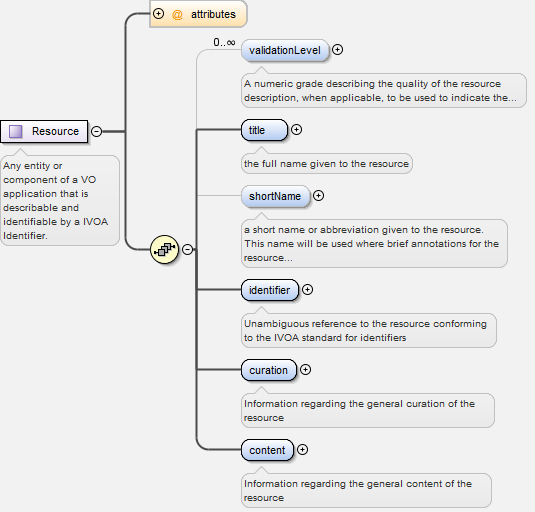
- VOFacility
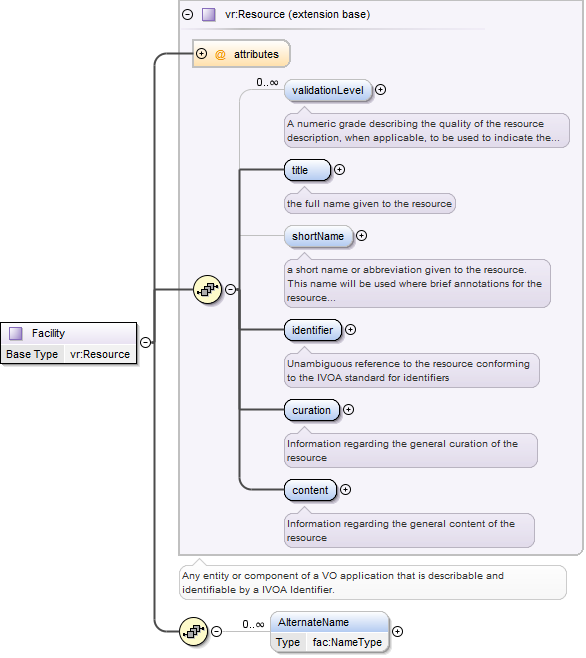
- Space Mission
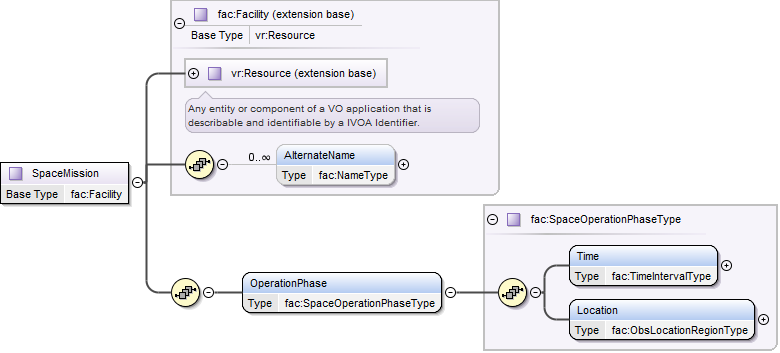
- Space craft
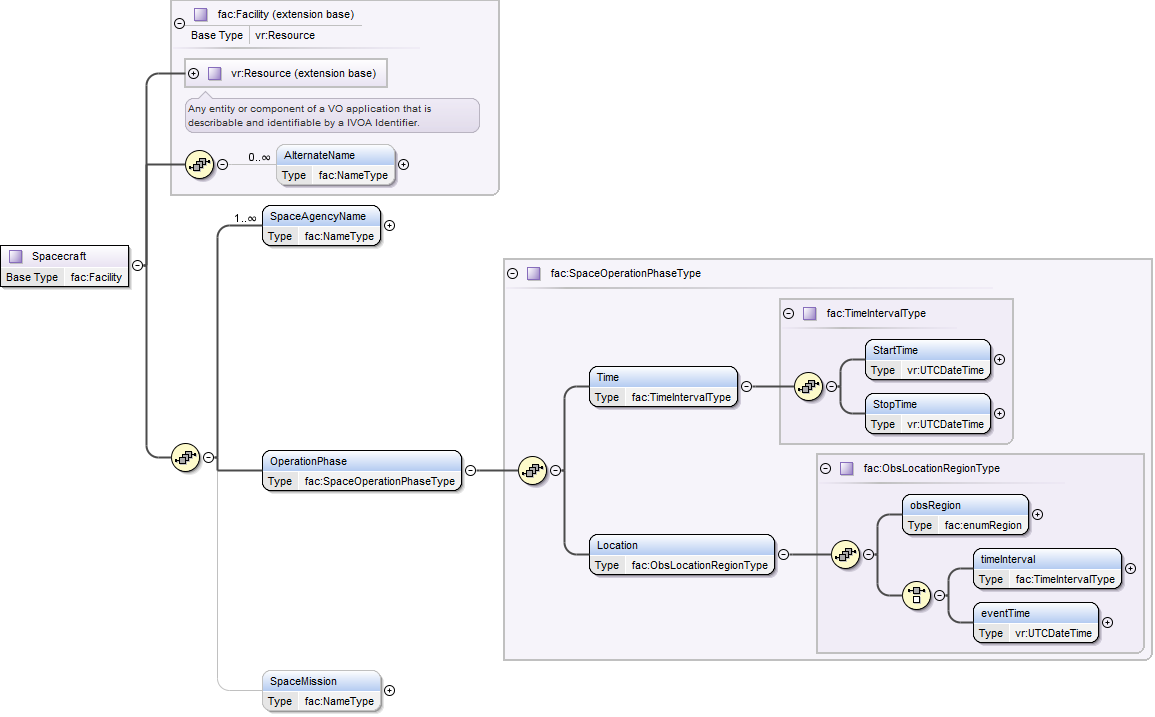
- Telescope
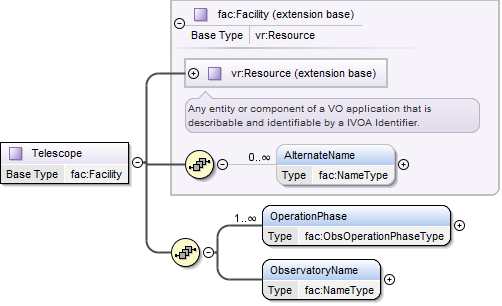
* Set ALLOWTOPICRENAME = TWikiAdminGroup
-->
| I | Attachment | History | Action | Size | Date | Who | Comment |
|---|---|---|---|---|---|---|---|
| |
ADASS2015-VOFacilities-posterv6.pdf | r1 | manage | 2794.0 K | 2017-03-14 - 20:56 | MireilleLouys | Facilities and Instruments schema description ADASS Poster 2015 |
| |
VOFacility_Facility.png | r1 | manage | 32.5 K | 2017-06-07 - 14:48 | MireilleLouys | VOfacility xml description as PNG graph |
| |
VOFacility_Observatory.png | r1 | manage | 39.5 K | 2017-06-07 - 14:51 | MireilleLouys | Observatory metadata |
| |
VOFacility_Resource.png | r1 | manage | 23.1 K | 2017-06-07 - 14:52 | MireilleLouys | VOresource Core object for all facilities description |
| |
VOFacility_SpaceMission.png | r1 | manage | 24.0 K | 2017-06-07 - 14:50 | MireilleLouys | Space mission object description |
| |
VOFacility_Spacecraft.png | r1 | manage | 50.5 K | 2017-06-07 - 15:11 | MireilleLouys | Space craft XML description |
| |
VOFacility_Telescope.png | r1 | manage | 17.9 K | 2017-06-07 - 14:49 | MireilleLouys | Telescope description |
Topic revision: r14 - 2017-06-07 - MireilleLouys
Log in or Register
IVOA.net
Wiki Home
WebChanges
WebTopicList
WebStatistics Twiki Meta & Help
IVOA
Know
Main
Sandbox
TWiki
TWiki intro
TWiki tutorial
User registration
Notify me Working Groups Interest Groups Committees
www.ivoa.net
Documents
Events
Members
XML Schema
Wiki Home
WebChanges
WebTopicList
WebStatistics Twiki Meta & Help
IVOA
Know
Main
Sandbox
TWiki
TWiki intro
TWiki tutorial
User registration
Notify me Working Groups Interest Groups Committees
www.ivoa.net
Documents
Events
Members
XML Schema
Ideas, requests, problems regarding TWiki? Send feedback


